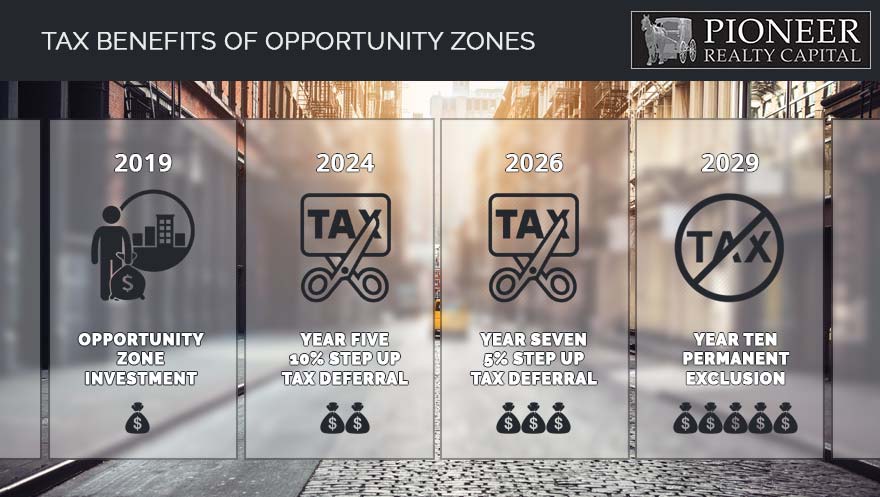Earlier this year, we explored the impact of opportunity zones on commercial real estate investing. Today, we’ll look a little deeper into how opportunity zones allow investors to reduce and defer taxes on capital gains for up to ten years.
But first, a little review:
What are Opportunity Zones?
The Tax Cuts and Jobs Act of 2017 identified over 8,700 opportunity zones in all U.S. states and territories. These are census tracks of low-income areas designated by state governors and certified by the U.S. Department of the Treasury via the IRS. Each track has a poverty rate of at least 20% or a median household income that is less than 80% of the median household income of its neighbors.
The goal of the act is to encourage investors to funnel capital gains into low-income areas that will benefit from development. As an incentive, investors in opportunity zones reap once-in-a-lifetime tax benefits.

What are the Tax Benefits of Opportunity Zones?
Opportunity zones allow investors to reduce, defer, and even avoid capital gains taxes. They especially reward long-term investors prepared to hold on to their property or equity for at least ten years.
Fully reaping the tax benefits of opportunity zones requires investing original capital gains from another asset. Invested cash is not eligible for capital gains tax exclusion. For investors who have or will soon have capital gains, however, looking into Qualified Opportunity Funds is the next step to big tax benefits.
A Qualified Opportunity Fund, or QOF, is an investment vehicle designed to invest in opportunity zone commercial real estate. According to Investopedia, it is a corporation or partnership that has filed IRS form 8996 with their federal income tax return. A QOF must invest at least 90% of its assets in designated opportunity zones to enjoy their tax benefits. These benefits include:
- Deferral of capital gain tax for original capital gains. An investor who realizes $100,000 in capital gains from an asset sale today can put all or part of that $100,000 into a QOF. Once there, the investor owes no taxes on that original capital gain until Dec. 31, 2026 or when the investment is sold, whichever comes first.
- Discounts on taxable amount of original capital gain. An investor who puts $100,000 in capital gains into a QOF will only pay taxes on $90,000 after holding the investment for five years. After seven years, that amount drops to $85,000. So, not only do QOFs defer capital gains tax, they also significantly reduce them. This is called step-up in basis, or simply step-up, tax exclusion.
- No capital gains tax on investments held ten years or more. Investors will have to pay capital gains tax on at least 85% of the original capital gain However, any capital gains realized for QOF investments held at least ten years are completely tax-free. If, for example, that $100,000 QOF investment rose in value to $190,000 over ten years, $90,000 is tax-free, and the investor only has to pay capital gains tax on 85% ($85,000) of their original capital gains invested.
This tax-free capital gain is called a permanent exclusion, a rare opportunity that makes QOFs extremely attractive to commercial real estate investors with long-term investment strategies.

Who can Invest in Opportunity Zones?
Opportunity zone investments go through QOFs, which are structured as partnerships or corporations. However, QOFs enable a wide range of investors to reap the tax benefits of opportunity zones. This includes:
- individuals
- multi-member LLCs
- s corporations
- partnerships
- c corporations
- RICs and REITs
- trusts
- estates
Qualified Opportunity Fund investments can be direct or indirect. This means investors can directly own property, or simply hold equity in it. If a property no longer qualifies as an opportunity zone for some reason after initial investment, it will still be treated as one for five years or until it is sold.
As mentioned before, the tax benefits of opportunity zones only apply when capital gains are invested from a previous asset sale. Importantly, these gains cannot be carried interest, which is received for services performed.
Business owners can also benefit from opportunity zones. By starting a business or relocating offices to qualified opportunity zones, an owner can enjoy capital gains deferral. Being located in an opportunity zone also attracts business investors eager to make the most of QOF tax benefits.

How do I Invest in Opportunity Zones?
The ideal opportunity zone investment starts with capital gains realized from a previous, recent asset sale.
Normally, capital gains like this trigger a tax event in the year they are earned. To leverage opportunity zones and avoid paying capital gains tax, an investor must put the gains into a QOF within 180 days of selling the asset. Take note: there are no extensions in the case of holidays or weekends. When timing a QOF investment, keep this in mind.
A QOF investment should support a business or renovate business buildings in an opportunity zone. At least 70% of tangible property owned or leased in a QOF must be qualified opportunity zone business property.
Certain “sin businesses” cannot be financed with a QOF. These include:
- golf courses
- country clubs
- massage parlors
- hot tub facilities
- sun tan facilities
- racetracks
- gambling facilities
- liquor stores
Qualified opportunity funds can finance industrial real estate, housing, infrastructure, and existing or start-up businesses. The investment must result in properties being substantially improved.

Get Help with Investing in Opportunity Zones
Making the most of opportunity zones requires research. The region’s economic growth, population growth, employment metrics and other variables all play a part. Additionally, some state tax structures and multi-state investments can complicate opportunity zone investment. With the right financial partner, however, informed decision making reduces risk and increases the chances of reward. Reach out to Pioneer Realty Capital today to find out if you can reap the tax benefits of opportunity zones.
At Pioneer Realty Capital we always offer a personal level of service and expert advisory to investors and owners of commercial real estate.
START INVESTING IN REAL ESTATE WITH AN INSIDER
Owners and investors of commercial real estate nationwide lean on Charles Williams, and the team at Pioneer Realty Capital to deliver value and service at every level. You can leverage over 20 years of insider experience and expertise when choosing a property or fund you want to invest into after signing up for your free account. Investing with an insider has never been easier.














Get Social